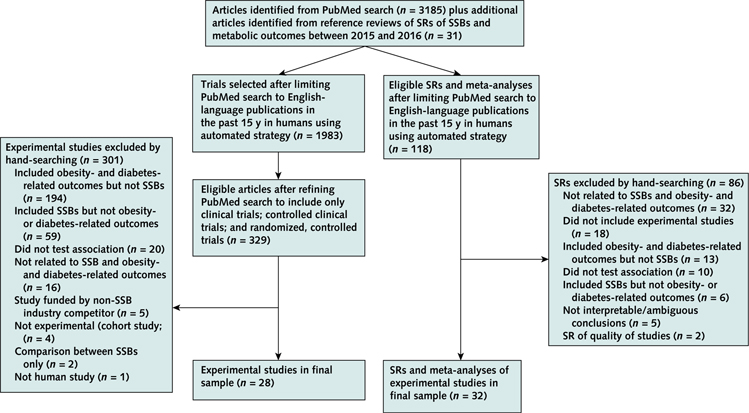Abstract
Background:
The outcomes of recent regulatory initiatives, tax measures, and federal nutritional guidance designed to curb consumption of sugar-sweetened beverages (SSBs) have hinged on whether these beverages are a proven cause of obesity and diabetes. The SSB industry has opposed such initiatives, claiming that causation is scientifically controversial (1). We comprehensively surveyed the literature to determine whether experimental studies that found no association between SSBs and obesity- and diabetes-related outcomes (negative studies) are more likely than positive studies to have received financial support from this industry.
Methods:
We searched PubMed from January 2001 to July 2016 for English-language experimental studies on the effects of SSB consumption on obesity- and diabetes-related outcomes, augmented by hand-searching recent reviews (Supplement, available at www.annals.org). Our strategy included (sugar* or “sugar-sweetened” or sweet* or fructose) and (beverage* or soda or soft drink) and (obesity or body mass index [BMI] or weight and/or diabetes or metabolism). To focus on causation, we included articles with experimental designs and systematic reviews or meta-analyses of experimental research. We excluded observational studies and studies supported by SSB competitors (bottled water and dairy industries). We classified articles as having positive or negative associations versus no associations. We identified whether articles were independently funded or were funded by, or had authors with financial conflicts with, the SSB industry.
Results:
We identified 60 studies (28 trials and 32 systematic reviews/meta-analyses of trials) that examined the effects of SSB consumption on obesity- and diabetes-related outcomes (Figure). Twenty-six articles (8 trials and 18 systematic reviews/meta-analyses) described no associations, and 34 articles (20 trials and 14 systematic reviews/meta-analyses) described positive associations. Studies funded by the SSB industry were significantly more likely to be negative independently funded ones: 25 of 26 studies (96.2%) had funding ties to this industry, whereas only 1 of 34 positive studies (2.9%) had such ties (relative risk, 32.70 [95% CI, 4.70 to 225.8]; P < 0.001).
Conclusion:
We established that experimental studies that have financial conflicts with the SSB industry are much more likely than independently funded ones to find no relationship between SSB consumption and metabolic outcomes. Although a systematic review done a decade ago found that nutrition-related studies favor the sponsors’ products (2), to our knowledge ours is the first systematic review of experimental studies that was designed to evaluate causal associations between SSBs and metabolic outcomes. The strength of the association between industry and null findings is more robust than that of the previous analysis (2), a convenience sample of studies of nutrition-related products (3), and a study of systematic reviews of artificially sweetened beverages and body weight (4).
Although some argue that research quality ratings for SSB studies do not differ greatly on the basis of the funding source, others contend that such studies with conflicts of interest have deficiencies that bias results toward the null hypothesis (5), many of which may not be detected in standard ratings. These deficiencies include choice of comparators, bias in defining confounders (versus mediators), biased coding of outcomes, bias in data analysis, selective outcome reporting, and designs that lack external validity. Current methods to assess risk of bias, such as those used by entities influential to health policy (for example, the U.S. Department of Agriculture Dietary Guidelines Advisory Committee Bias Assessment Tool), are probably insufficient because they do not include funding source as a risk of bias.
In conclusion, clinical trials and systematic reviews of trials in which the conduct of research or investigators were supported by the SSB industry were much more likely to find no association between their products and metabolic outcomes than those that were independently funded. This industry seems to be manipulating contemporary scientific processes to create controversy and advance their business interests at the expense of the public’s health.
Supplementary Material
Figure.
Study flow diagram.
Trials are presented on the left; SRs and meta-analyses are presented on the right. SR = systematic review; SSB = sugar-sweetened beverage.
Acknowledgments
Grant Support: Dr. Schillinger was supported by grant 2P30 DK092924-06. Ms. Tran was supported by grant 5T32DK007418–35. Dr. Mangurian was supported by grant K23MH093689. Dr. Kearns was supported by National Institute of Dental and Craniofacial Research grant DE-007306.
Footnotes
Disclosures: Disclosures can be viewed at www.acponline.org/authors/icmje/ConflictOfInterestForms.do?msNum=L16–0534.
Contributor Information
Dean Schillinger, University of California, San Francisco, and Center for Vulnerable Populations at Zuckerberg San Francisco General Hospital San Francisco, California.
Jessica Tran, University of California, San Francisco, and Center for Vulnerable Populations at Zuckerberg San Francisco General Hospital San Francisco, California.
Christina Mangurian, University of California, San Francisco, and Center for Vulnerable Populations at Zuckerberg San Francisco General Hospital San Francisco, California.
Cristin Kearns, University of California, San Francisco, Philip R. Lee Institute for Health Policy Studies and School of Dentistry San Francisco, California.
References
- 1.Schillinger D, Jacobson MF. Science and public health on trial: warning notices on advertisements for sugary drinks. JAMA. 2016;316:1545–6. doi: 10.1001/jama.2016.10516 [DOI] [PubMed] [Google Scholar]
- 2.Lesser LI, Ebbeling CB, Goozner M, Wypij D, Ludwig DS. Relationship between funding source and conclusion among nutrition-related scientific articles. PLoS Med. 2007;4:e5. [DOI] [PMC free article] [PubMed] [Google Scholar]
- 3.Nestle M. Corporate funding of food and nutrition research: science or marketing? JAMA Intern Med. 2016;176:13–4 doi: 10.1001/jamainternmed.2015.6667 [DOI] [PubMed] [Google Scholar]
- 4.Mandrioli D, Kearns CE, Bero LA. Relationship between research outcomes and risk of bias, study sponsorship, and author financial conflicts of interest in reviews of the effects of artificially sweetened beverages on weight outcomes: a systematic review of reviews. PLoS One. 2016;11:e0162198. doi: 10.1371/journal.pone.0162198 [DOI] [PMC free article] [PubMed] [Google Scholar]
- 5.Stanhope KL. Sugar consumption, metabolic disease and obesity: the state of the controversy. Crit Rev Clin Lab Sci. 2016;53:52–67. doi: 10.3109/10408363.2015.1084990 [DOI] [PMC free article] [PubMed] [Google Scholar]
Associated Data
This section collects any data citations, data availability statements, or supplementary materials included in this article.



